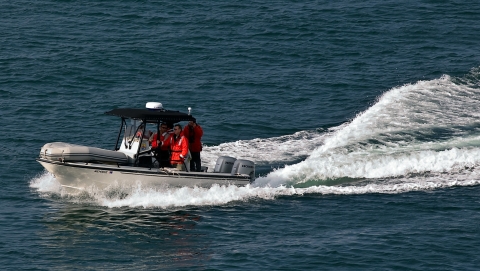Ways to Get Involved
Positions with the U.S. Fish and Wildlife Service are challenging and gratifying. Whether permanent full-time, temporary, seasonal, or volunteer, your time and effort makes a difference.
Careers with the U.S. Fish and Wildlife Service
For information about jobs with the Fish and Wildlife Service go to https://www.fws.gov/humancapital/.
Seasonal Opportunities
Maine Coastal Islands National Wildlife Refuge hires several field researchers (island supervisors and technicians) to monitor seabird colonies on islands along the Maine coast each summer. While living on the islands, researchers conduct censuses of all nesting seabird species, monitor productivity, observe chick feedings, band chicks, read adult bands, and monitor predators and competitors. Experience with boat operation, bird identification, and seabird ecology is preferred but not required. Applicants must be willing to live, and work, with other researchers on remote islands, often under harsh weather conditions.
For more information, contact Michael Langlois, Refuge Biologist at michael_langlois@fws.gov or (207) 594-0600 ex. 5113
Volunteering
Maine Coastal Island's volunteer program offers you the opportunity to support wildlife and its habitat while learning new skills and doing something that you enjoy. Refuge volunteers help with administrative, public use, and biological projects. Unfortunately, the refuge cannot offer housing. For more information, contact Teressa Cultrera, Refuge Administrative Assistant at teressa_cultrera@fws.gov or (207) 546-2124 ex. 0.
For information on other volunteer opportunities with the Service, visit http://volunteers.fws.gov
Our Partners
The U.S. Fish and Wildlife Service works closely with other government agencies, non-profit organizations, educational institutions, and private individuals to accomplish wildlife and habitat management goals at Maine Coastal Islands National Wildlife Refuge.
Partnerships between the Service and other public and private organizations are key to the success of seabird restoration efforts at the Maine Coastal Islands National Wildlife Refuge. Since 1984, refuge staff have worked closely with representatives from the Maine Department of Inland Fisheries and Wildlife, College of the Atlantic, National Audubon Society, Maine Audubon Society, and Canadian Wildlife Service in the Gulf of Maine Seabird Working Group. The Group guides restoration efforts on Maine's offshore islands, including those in the refuge complex.
The Maine Coastal Islands National Wildlife Refuge is pleased to have as its newest partner the Friends of Maine Coastal Islands NWR. The Friends of Maine Coastal Islands describes its mission as supporting the Refuge in its efforts to conserve, protect and enhance the rich diversity of coastal habitats, seabirds and other wildlife. Friends of Maine Coastal Islands is based at Maine Coastal Islands National Wildlife Refuge's Rockland visitor center. The organization has made valuable contributions in support of the refuge's operations and natural resources.
Since the early 1980s, the National Audubon Society has worked with the Service to restore seabirds to Seal Island, located 21 miles southeast of Rockland, Maine. Through its Project Puffin, the Society successfully re-introduced Atlantic puffins to the island by transporting chicks from Newfoundland, Canada, and hand-raising them. Puffins now nest on the island, after a 150-year absence. Seal Island also supports the largest tern colony in the Gulf of Maine, with 2,000 pairs. Audubon is working with the Service to manage and restore seabirds on Matinicus Rock and Pond Island.
The Service works with private organizations at the local, state, and national levels to add land to the refuge. These groups serve a vital function by purchasing and protecting property until it can be acquired by the Service. Through conservation easements, refuge staff help landowners manage their properties for wildlife.



